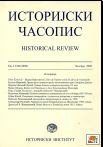Кредитна политика уставобранитеља
Lending Policy of the Constitutionalists
Author(s): Bojana Miljković KatićSubject(s): History
Published by: Istorijski institut, Beograd
Keywords: public loans; loans on mortgage; state funds; Constitutionalists; Serbia; 19th Century
Summary/Abstract: In order to boost economic development of the country, including development of its trade particularly, the Constitutionalists introduced, in 1839, a public loan on mortgage based on state funds (on the state treasury fund and widowhood, school, municipal, pupilary and church funds), and by means of series of additional regulation made the credit legislation both altered and organized. The state treasury made the basic credit fund, having the highest amount of assets on its disposal and granting loans on the lowest interest rates. The other state funds managed lower amounts of money and used to grant mostly low scale loans, occasionally on higher interest rates. In 1841 credit terms were tightened, with the minimal granted state treasury loan totaling 300 Ducats, making borrowing on small scale disincentive and directing the loan policy towards giving support to the national commercial elite. That way, congenially to the grocery trade policy, the available capital was concentrated within small segments of economic life, chosen the way to support the economic activities that were, in the opinion of the Administration, able to facilitate faster economic development of the country. Because of the lack of reconciliation among principles and practice, many segments of Serbian 19th Century economic development were featured by, a considerable amount of these resources was used by the political elite. In the late period of the Constitutionalists` rule (1858), the loan granting terms were unified, in addition to introduction of much more favorable general stipulations on lending, resulting in direction of credit policy towards giving financial support to both middle and less wealthy businessmen. In the area of private lending, the Constitutionalists kept the legislation dating from times of Miloš Obrenović valid, without showing any serious reactions on pressures put by the public, while the public itself was arguing that it was tolerating illegitimate interest rates and that private loans, mostly usurer ones, were destroying the heavily indebted population.
Journal: Историјски часопис
- Issue Year: 2011
- Issue No: 60
- Page Range: 357-375
- Page Count: 19
- Language: Serbian

